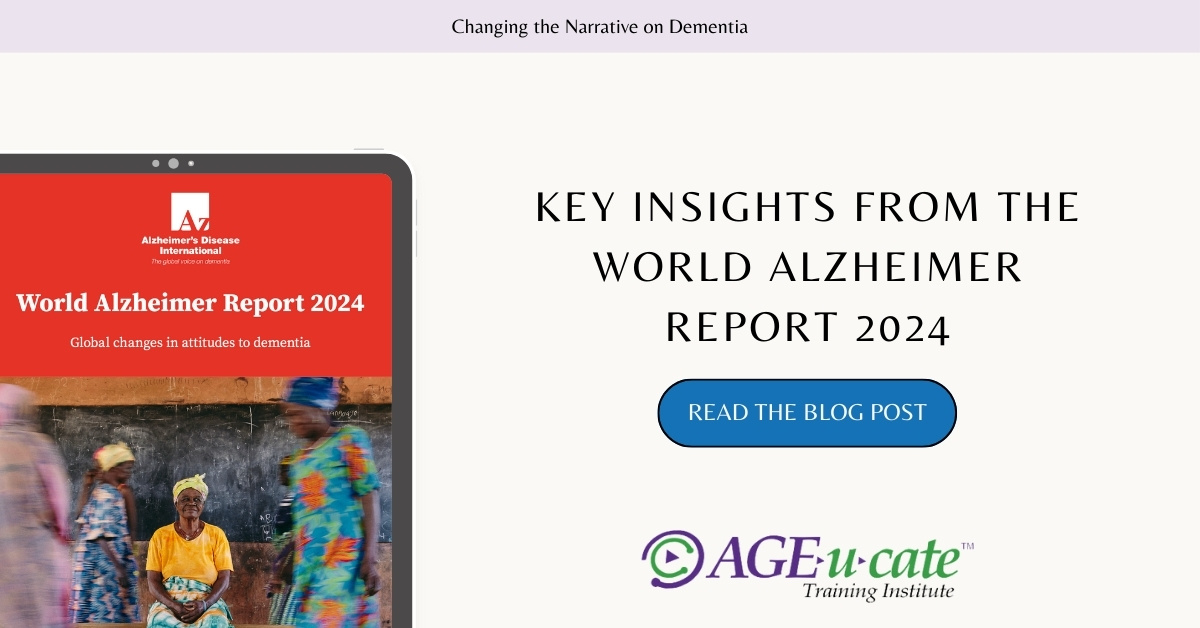The State of Dementia Awareness: Insights from the World Alzheimer Report 2024

Dementia is one of the most pressing global health challenges of our time, yet misconceptions and stigma remain major barriers to quality care. The World Alzheimer Report 2024 sheds light on shifting attitudes, persistent misunderstandings, and the urgent need for education in healthcare and communities.
For care providers, and community leaders, the report presents a clear call to action: We must challenge outdated beliefs, improve public understanding, and foster more supportive environments for those living with dementia.
Key Findings: What Care providers Need to Know
The World Alzheimer Report 2024 reveals significant shifts in attitudes toward dementia—some promising, others deeply concerning. Below are critical insights that highlight where improvements in education, training, and community support are needed:
1. Persistent Misconceptions Among Healthcare Professionals
Even within the medical community, 65% of health and care professionals still believe dementia is a normal part of aging, up from 62% in 2019. This growing misconception risks delays in diagnosis, missed opportunities for intervention, and reduced quality of care.
💡 What This Means for Healthcare Providers:
- Ongoing professional training is essential to ensure that dementia is recognized as a neurological disease—not just a byproduct of aging.
- Education efforts must extend beyond specialists; general practitioners, nurses, and care staff need updated dementia knowledge.
2. Rising Public Misunderstanding: The Need for Widespread Awareness
In 2019, 66% of the general public believed dementia was an unavoidable part of aging. Today, that number has jumped to 80%. This widespread misunderstanding prevents individuals from seeking early interventions and fuels stigma.
💡 What This Means for Care Providers:
- Clear communication with patients and families is more important than ever.
- Care providers must become trusted sources of accurate information to combat these misconceptions and encourage proactive care planning.
3. High Levels of Discrimination & Isolation
- 88% of people living with dementia report experiencing discrimination.
- 31% avoid social situations, and 36% withdraw from work opportunities.
💡 Action Steps for Care Professionals & Community Leaders:
- Implement dementia-friendly care models that focus on social inclusion and reduce stigma.
- Provide training for businesses, public institutions, and local organizations to foster more dementia-friendly environments.
AGE-u-cate’s Dementia Live® program is one example of an experiential training tool that helps caregivers, professionals, and first responders develop empathy for those living with dementia.
4. Growing Fatalism About Prevention: The Power of Modifiable Risk Factors
Many still believe dementia is unavoidable. Over a quarter of people globally think nothing can be done to prevent it, and in lower- and middle-income countries, this belief has surged from 20% in 2019 to 37% today.
💡 Practical Steps for Healthcare & Community Leaders:
- Public health campaigns should emphasize modifiable risk factors such as cardiovascular health, physical activity, and cognitive engagement.
- Patients should be encouraged to adopt lifestyle habits that support brain health.
5. Public Willingness to Support Change
Despite these challenges, there is hope. More than 80% of the general public believes they can influence dementia support through their vote. This suggests a growing readiness to back initiatives that improve dementia care.
💡 How Healthcare Leaders Can Leverage This Momentum:
- Advocate for dementia-friendly policies at the local, state, and national levels.
- Encourage organizations to invest in dementia education and training for staff, caregivers, and first responders.
Case Example: The Power of Education in Dementia Care
A recent Dementia Live® training session conducted by AGE-u-cate Training Institute helped a team of first responders gain a deeper understanding of dementia. Many of the participants admitted they had previously misunderstood the disease, but the experience left them better equipped to handle emergency situations with empathy and care.
This underscores the impact of grassroots education and experiential learning in reshaping dementia care.
Final Thoughts: Moving from Awareness to Action
The findings of the World Alzheimer Report 2024 highlight both challenges and opportunities. Healthcare professionals, caregivers, and community leaders have a unique role to play in transforming dementia care by:
✔ Educating patients and families about dementia as a disease, not just aging.
✔ Providing dementia-friendly environments and support systems.
✔ Advocating for proactive prevention strategies and risk-reduction education.
✔ Ensuring continuous training for care teams and first responders.
Explore More Resources & Take Action
To read the full World Alzheimer Report 2024, visit:
📄 Download the report
Learn more about Alzheimer’s Disease International and global efforts to improve dementia care:
🌍 Visit ADI’s website
For training resources and tools to create dementia-friendly communities, explore AGE-u-cate’s education programs:
🔹 AGE-u-cate Dementia Resources

